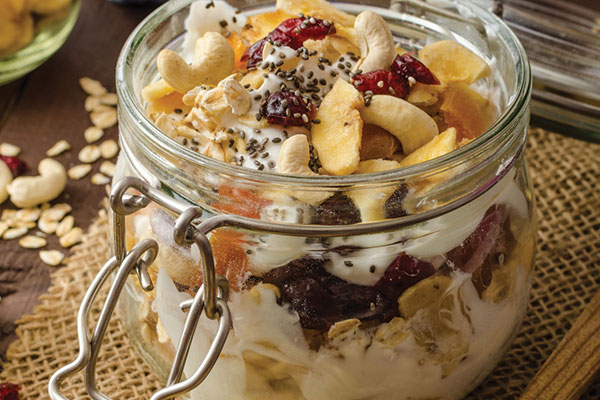4 Ingredients for Staying Well Nourished during Cancer Treatment
by Mary-Eve Brown
Good nutrition is an important part of every cancer survivor’s treatment plan. Research has shown that people who are able to keep up their weight and strength during treatment are better able to handle treatment-related side effects and have an overall better quality of life. However, it’s not always easy to get the nutrition you need during cancer treatment.
Many side effects of treatment can interfere with your ability to eat well. That’s why you need a nutrition care plan. A nutrition care plan is a roadmap for navigating the treatment-related barriers to good nutrition. Your healthcare team or a dietitian can help you develop an individualized plan that meets your unique nutritional needs. However, there are a few fundamental strategies that work well for almost all cancer survivors. Let’s have a look at the four basic ingredients for staying well nourished during cancer treatment.
1. Drink up.
Dehydration can make you feel weak, fatigued, dizzy, nauseated, and constipated. It can also cause dry mouth. To find out exactly how much fluid you need to stay hydrated, divide your body weight by 2.2. That number is how many ounces of liquid you need to drink each day. All caffeine- and alcohol-free fluids count as hydration. During cancer treatment, it’s a smart idea to keep track of the amount you are drinking.
Bonus tip: If you’re having trouble getting enough nutrients and calories from food, try drinking calorie-rich, nutrient-rich beverages. For example, vegetable juice, smoothies, nutrition shakes, bean-based soups, and milk. You’ll get nutrition and hydration all in one.
2. Eat your protein.
Cancer treatments work by destroying cancer cells, but in the process, they can also damage healthy cells. To replace the healthy cells damaged by cancer treatment, your body needs protein. Some examples of high-protein foods are poultry, fish, seafood, beef, pork, lamb, nuts, lentils, beans, seeds, soy, and dairy.
Bonus tip: Sometimes… cancer treatments can make eating animal proteins unappealing – or you may be vegetarian or vegan. In that case, plant-based proteins an excellent choice. Try peanut butter on toast, lentil soup, hummus and pita chips, or trail mix packed with nuts and seeds.
Effortless Ways to Add More Nutrients to Your Diet
While you are undergoing cancer treatment, you want the foods you eat to be as nutritious as possible. Here are a few simple tips for adding more nutrition to your meals and snacks.
- Top a baked potato or mashed potatoes with hummus or bean dip.
- Mix nuts and dried fruit into oatmeal.
- Add a slice of avocado or a smear of hummus to your sandwiches.
- Mix ricotta cheese into pasta.
- Add cheese and vegetables to an omelet.
- Top soups with sour cream and cheese.
- Add peanut butter to a protein shake.
- Top cooked vegetables, like broccoli, with melted cheese.
- Sprinkle some dried fruit and granola into your yogurt.
3. Keep up your weight.
Some cancer treatments can cause you to lose weight and strength very quickly. This happens for a variety of reasons – reduced appetite, taste changes, fatigue, nausea and vomiting, bowel issues, and sore mouth. Weight loss can also occur because your body is using more calories and protein than normal while fighting cancer. Try to eat small, frequent meals packed with calories and protein.
Bonus tip: It’s easy to add extra calories to what you’re already eating by tossing in some healthy fats, like vegetable oils or avocado. For example, blending half an avocado or a tablespoon of olive oil into a smoothie or shake can add about 100 calories without increasing the volume.
4. Take care of your gut.
Many cancer treatments can affect gut function, causing reflux, nausea, diarrhea, and constipation. To help with reflux, nausea, and diarrhea, eat small, frequent meals consisting of foods that are easy to digest. Think foods that are bland, low-fat, low in fiber, and that don’t give off strong odors. For example, yogurt, baked potatoes, broth, oatmeal, toast, sherbet, cold cereal with milk, milkshakes, and smoothies. For constipation, make sure you are drinking enough fluids.
Bonus tip: Prunes are a natural way to manage constipation. Try mixing three tablespoons of bran cereal with two tablespoons of applesauce and one tablespoon of prune juice, and eat one tablespoon of this mixture three times a day.
 Mary-Eve Brown has been a registered dietitian with the Academy of Nutrition and Dietetics for more than 20 years. She is also a board-certified specialist in oncology with the Academy and has been an outpatient oncology dietitian at the Johns Hopkins Sidney Kimmel Comprehensive Cancer Center in Baltimore, MD, for more than 15 years.
Mary-Eve Brown has been a registered dietitian with the Academy of Nutrition and Dietetics for more than 20 years. She is also a board-certified specialist in oncology with the Academy and has been an outpatient oncology dietitian at the Johns Hopkins Sidney Kimmel Comprehensive Cancer Center in Baltimore, MD, for more than 15 years.
If you are experiencing barriers to getting good nutrition during cancer treatment, consider working with a registered dietitian to develop a personalized nutrition care plan.
This article was published in Coping® with Cancer magazine, September/October 2017.


